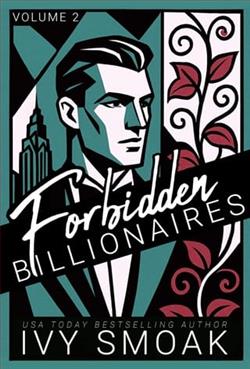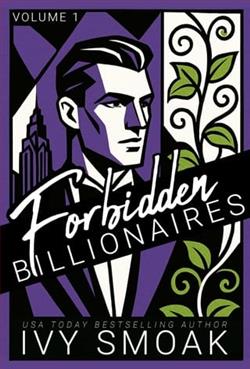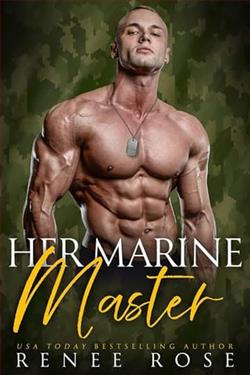Page 24 of So Far Gone
Kinnick looked from Kel to Lucy. “I’m getting help from a guy named Crazy Ass Chuck? Youdateda guy named Crazy Ass Chuck?”
Lucy gritted her teeth: not what she wanted to talk about. “Chuck is notcrazy. He can get a little... excitable. And he’s got some issues.” She shot a glare at Kel. “But who doesn’t? Chuck’s a good man. And he was a good cop until they forced him out.”
“Wait. Not Chuck Littlefield?” Kinnick remembered stories from around the time he left Spokane, the jittery, quotable major crimes detective who got sideways with brass and ended up getting transferred. “You dated Chuck Littlefield?”
Lucy turned the glare from her kid to Kinnick. “You and I are not talking about this!” She went into the kitchen, filled her coffee cup, then stalked through the dining room. “Be ready in fifteen minutes, Kinnick. And for God’s sake, take afuckingshower! You smell like the business end of a hobo.”
As her bedroom door slammed, Kel’s eyes opened wide. “Day-amn!You got a morning F-bomb. I thought only I got those.”
Kinnick sniffed his shoulder. “I had a shower yesterday. Have people always been this intense about hygiene, or is this something new?”
“No, I think it’s been around for a while.” Kel sniffed the air. “Hey, you want to borrow a shirt, man?”
***
For a decade, Chuck Littlefield was the man about Major Crimes, a muscly, fidgety homicide detective who also happened to be every reporter’s best source—the only good quote in an otherwise tight-lipped, tight-assed cop shop. His bosses, however, viewed him—and not without reason—as a double-dealing ball hog, a leaky ship, a selfish, glory-seeking nonteam player. They tired of his constant overtime requests and the way details of his cases mysteriously showed up in news stories. And, for his part, Chuck hated the way his bosses rejected his perfectly reasonable requests for fiber analysis and forensic carbon dot powder, for any new investigative tool, which they always dismissed as needless and expensive.
When the funding was cut for a cold case homicide unit that Chuck had hoped to start (and ride into retirement), an anonymous source was quoted in the newspaper, in a story written by the criminal justice reporter Lucy Park, calling the new police chief “a bureaucrat with a toy badge” who had “all the law enforcement instincts of a fat, old bookkeeper.”
Two weeks later, Chuck was relieved of his Major Crimes duties and shipped off to Property Crimes, the unit where burnout detectives were sent to die, and where he was tasked with serving out the last nine months of his twenty-five-and-change parked at a desk, herding paper. The problem with this castaway punishment was that Spokane was a property crime town, in the same way that other cities were homicide towns, or gang towns. Every night, meth and opioid zombies wanderedthe streets looking for open garages, for backpacks left in cars, for anything that could be lifted, looted, or lightened from its owners’ unwitting hands.
But since no one would ever mistake a filched lawn mower for “a high priority crime” (especially in a city with twenty or thirty homicides a year), funding for property crimes had remained stagnant for years. That meant just a handful of officers, two clerks, and one receptionist were assigned to the basement unit, a department so overwhelmed they could do little more than shuffle paper and occasionally answer the constantly ringing telephone, all while supposedly on the lookout for patterns that suggested more sophisticated burglary rings. And while property crimes continued to rise each year, even those numbers couldn’t capture the full scope of the problem, because most thefts went unreported—once citizens learned that filing a police report was almost as helpful as tossing a coin into a fountain.
And even if it were possible to penetrate the labyrinthian, automated crime-report telephone system, and talk to a human being (it wasn’t), you wouldn’t find much help there, either. If you were lucky, you’d get a muttering old detective quietly browsing Arizona condos on his computer while he indulged your sob story. “Uh-huh. And did you register your bike? (nine-hole executive golf course) Uh-huh. And do you have the serial number? (community pool) Uh-huh. And have you checked the pawn shops? (Maybe I’ll try Sedona.)”
Chuck spent a few weeks in 2017 in this cord of human deadwood,uh-huhinghis way through dull reports, until one day: epiphany! The “fat, old bookkeeper” of a police chief with the “toy badge” had, like every boss in the world over the last twenty years, gotten his job by selling himself as a champion of “quantitative, measurable units of policing.”
Stats.
So, one day, Chuck looked up the numbers of his new unit. The SPD Property Crimes division maintained an “active solution/recovery rate”of between 2 and 5 percent. That’s when Crazy Ass Chuck Littlefield devised his cruel and brilliant revenge.
First, he went off his meds. Then, he printed out every report of every property crime that had come in over the last two weeks, and he drove his pickup truck to each pawn shop in the city, one by one. He examined each bike and television and rototiller in the shops and compared them to the stolen property reports, and anytime he found a serial number that was the same, or a photographic match, he confiscated the stolen item and threw it in the back of his truck. He dared the pawn shops to object, but they could do nothing. They knew the score. They were required by law to have on file a receipt with the seller’s (i.e., thief’s) name, address, and photo ID. But everyone knew what kind of flaccid, disinterested cops worked property crimes, and since they hadn’t been visited by a living badge in a decade, the pawn shop workers had gotten lax about checking the fake names on the receipts for the stolen shit they purchased every day. The last thing they wanted to do was rat out their suppliers (i.e., thieves). So, for two months, in the grips of a growing bipolar hypomania, Chuck terrorized both the pawn shopsandhis fellow Property Crimes detectives, solving a record9percentof the property crime cases that came across his desk.
In that time, he also recovered a euphoric sense of purpose that he hadn’t felt since he was a young cop in his first car. Returning stolen property was almost better than sex. Bicyclists pumped his hand and thanked him like he’d just delivered their first babies. Contractors got emotional when Chuck pulled up with tool chests taken off their trucks and their job sites. “I have worked in this city for twenty years,” one backhoe operator said, “and I’ve never so much as gotten a crescent wrench back.”
“Just doing my job,” Chuck said.
One woman, who had her jewelry box (inlaid with mother-of-pearl) recovered by the handsome detective, with most of the jewels still inside, even tried to seduce him, and while he was tempted, Chuck knewbetter than to mess with this selfless, transcendent feeling. “You’re like... some kind of hero,” she said as he John-Wayned away from her house toward his pickup.
Even his lieutenant was impressed. “What in the fuck do you think you’re doing, Littlefield?”
“Just solving crimes, Lieu,” Chuck said. “Isn’t that what I’m supposed to do?”And, he thought,I am shoving these impossible stats up your worthless ass.
“You know we can’t maintain this,” the LT said. “Once you retire, our numbers will drop off a cliff.”
“Oh, I don’t know,” Chuck said, “you’ve got some good people here.”
At that, he and the LT both turned to look at the two souls who happened to be at their desks that day: a receptionist playingCandy Crushon her cell while the office phone rang into oblivion; and red-faced Madman McCallister arguing on the phone with the contractor who was rebuilding the dock at his cabin at Lake Coeur d’Alene and apparently doing a shit job. (Uh-huh, and how much for a dock that actually fucking floats?)
Chuck’s last month on the job, he worked eighty-hour, seven-day weeks, returning stolen goods like some kind of inverse Robin Hood. The pawn shops had tightened up again, and so Chuck struggled to make his target—double digits—but in his last two weeks he hit an astounding13 percentsolution rate, a number so impressive and utterly unbreakable that even some of his lazier, more cynical colleagues were impressed, two of them giving him a standing ovation when he packed his things to leave on his final day (the other two people in the office gave him the finger).
“You’re like the Joe DiMaggio of assholes,” his lieutenant said. “And when our numbers fall back to earth, I’m dead.”
“Don’t sell yourself short,” Chuck said, thinking,No one deserves it more.
But then retirement came, and along with it, the severe depressionthat always followed a good mania. But this felt like more than just a dark mood. The only life that Chuck Littlefield had ever known... was over. For a while he thoughthemight be over, too—just forty-seven years old and already put out to pasture. He put on weight. Started drinking heavily. One night, he stood on the Monroe Street Bridge, looking over Spokane Falls as it roared and tumbled into the river canyon, and thought,Why not?But he didn’t jump, and eventually, he found his way back to his mood stabilizers, and vowed to enjoy retirement, the way other cops seemed to. He bought new skis and hit all six mountains within two hours of Spokane. He played on a softball team, and spent his days at the local tribal casinos, where he lost so much money playing poker that he had to get a job. He got hired as an investigator for a law firm, tracking down philandering husbands and wives, interviewing people who were suing their contractors, suing their employers, suing their doctors, spouses, siblings, parents, anyone. It was like being in Property Crimes again, the endless, dull parade of people who wanted to take someone to court.
One day Chuck was in the grocery store, when he saw, in the greeting card and magazine aisle, behind a Covid-19 mask, the former police reporter Lucy Park, who had written the story that effectively ended his career. Something about that mask highlighted her lovely eyes. He could still visualize what she had in her cart that day: Frosted Flakes, red wine, romaine lettuce, coffee, and aVanity Fairmagazine. She asked how he was doing. (“Never better,” he lied. “Me, too,” she lied back.) She apologized for writing the story in which he criticized the new police chief, but Chuck waved this off. It had been the best thing that had happened to him, he explained, getting exiled to Property Crimes. He’d rediscovered his purpose as a cop. She, too, had been exiled, she said, moved off her old reporter beat into a desk job, eventually becoming assistant metro editor.















